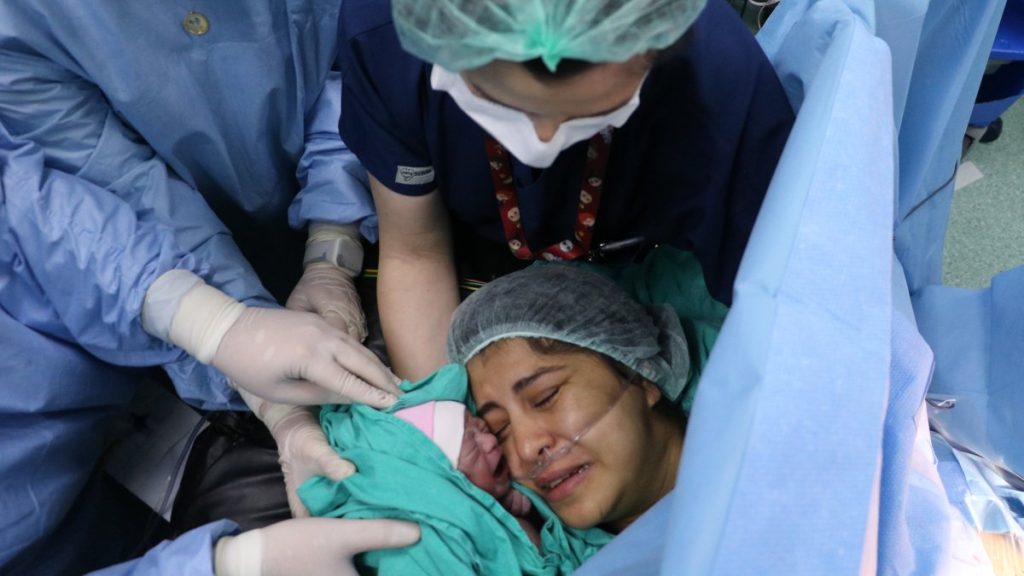In Istanbul, 37-year-old Ayfer Sarıtaş, who survived with a lung transplant in 2018, has become the first patient in Türkiye to give birth after such a procedure despite doctors warning that it would be risky.
Ayfer Sarıtaş, a 37-year-old woman from Istanbul, became the first person in Türkiye to give birth after a lung transplant. Diagnosed with bronchiectasis, she underwent a transplant in 2018 and later pursued her dream of motherhood despite doctors warning of life-threatening risks.
Determined, she opted for IVF and succeeded on her third attempt. Her pregnancy was closely monitored for 34 weeks at Koşuyolu High Specialization Training and Research Hospital in Istanbul. She gave birth to a healthy baby boy, whom she named Umut (Hope), on May 7.
Sarıtaş said she was inspired by similar cases abroad and pushed forward with her doctors’ support, adjusting medications and signing consent forms acknowledging the risks. “I wanted to live this experience and give hope to others,” she said.
She also mentioned being separated from her baby for a time after birth. “Of course, I miss him. I want to hold him as soon as possible. But I know that his health and mine are more important than anything else. I’m carrying on with that awareness,” she said.
Her husband, she added, was supportive throughout. “When we got married, I was still dependent on an oxygen machine. He was with me through it all. My husband and family were the only reason I was able to hold onto life again.”
“I’m happy and at peace. To live through something unprecedented was truly special for me. Giving hope to other transplant patients who want to become mothers fills me with pride. I thank all my doctors and everyone who supported me – especially my family and Dr. Ayşe Nigar Izgi.”
Izgi, a specialist at Koşuyolu High Specialization Training and Research Hospital, explained that she first met Sarıtaş when the latter was referred for a lung transplant.
“She was in critical condition. We couldn’t discharge her from the hospital. She was dependent on high-flow oxygen, waiting for a donor. But she never lost hope. A suitable organ was found in September 2018, and the transplant was successfully carried out,” Izgi said.
Starting from the first year after the transplant, Sarıtaş expressed her desire to become a mother.
“At a social event we organized with our transplant patients, she took the microphone, shared her story, and said, ‘Next, I want to become a mother.’ It had only been a year since her transplant – still a very early stage. We were hesitant. In fact, pregnancy is strictly prohibited for at least two years post-transplant,” Izgi explained.
She emphasized that no one in Türkiye had ever given birth after a lung transplant. “When Ayfer returned for a follow-up five years later, she brought it up again. Pregnancy after a lung transplant is much riskier than pregnancy in healthy individuals,” she said.
“Despite that, Ayfer was incredibly determined and optimistic. She never lost hope, even while waiting for an organ. She told us, ‘I accept all the risks and want to try.’ At that point, we couldn’t object anymore. We started this journey together.”
Izgi said they stopped some of her medications and monitored her very closely. “We followed up with her every week for about a year and a half,” she said.
“Finally, yesterday, at 34.5 weeks, Ayfer – who never gave up hope – gave birth to baby Umut,” Izgi said. “Both the baby and the mother are doing very well. Because the baby was born at 34 weeks, he will be monitored in the neonatal unit for another week to 10 days. But he has no health issues.”
There are over 100 cases globally of women who became pregnant after a lung transplant, Izgi noted. “This is a first for Türkiye. Ayfer dreamed of becoming a mother. After the transplant, she returned to her social and professional life. We had to respect her decision. And everything went well, just as she had hoped.”
With Mother’s Day only a few days away, Izgi added, “This year, Ayfer will celebrate her first Mother’s Day as a mother.” She described the moment of birth: “It was very emotional. The baby cried as soon as he was born.”
Pregnancy after a lung transplant is highly risky and critical, as it involves managing the complexities of immunosuppressive medications, the strain on the body from pregnancy, and the potential for complications such as preterm birth or organ rejection.
The transplant recipient’s immune system is suppressed to prevent rejection of the new lung, making them more vulnerable to infections and other health issues during pregnancy. Close, specialized monitoring and careful management are required throughout the pregnancy to ensure both the mother’s and baby’s health and safety.


